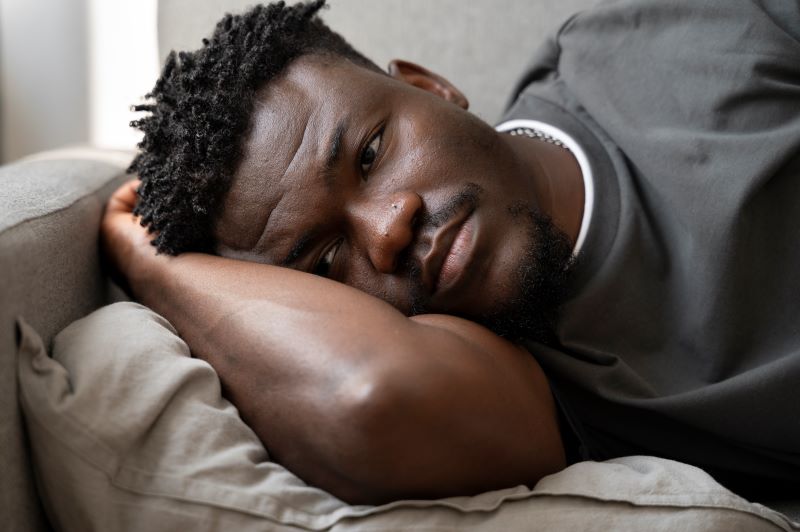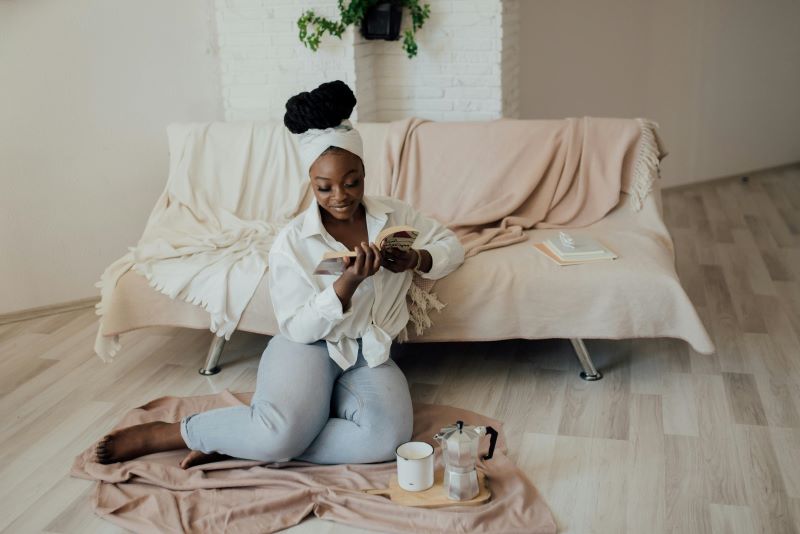Image by Freepik
“Why are you crying, don’t you know you are a man?” This phrase is all too familiar for many men. From a tender age, most Black men are taught that showing vulnerability makes them weak. They are told to toughen up, suck it up, don’t be such a wuss, a toxic masculinity culture teaching them to suppress their feelings. Black men are bottling it up and crying in solitude because they are afraid of what others might think if they saw them in such a vulnerable state. Women are allowed to express their emotions, but men are expected to bottle them up. Isn’t that a double standard? Emotions are a normal part of human experience, regardless of gender.
Toxic masculinity, a harmful set of beliefs and behaviors that often dictate how men should act, can be a recipe for disaster, especially when it comes to mental health. For Black men, the weight of expectations can be crushing, especially having to navigate systemic racism and economic inequality while trying to survive in a world that regularly invalidates their emotions and experiences. These harmful stereotypes can prevent these men from getting the help they need, leading to negative consequences for their mental health and well-being.
Systemic discrimination, police brutality, and microaggressions also create a toxic environment for Black men, contributing to a greater likelihood of mental health challenges like PTSD, anxiety, and depression. Yet, toxic masculinity discourages them from seeking professional help, further isolating them from the resources they need.
Though conversations about mental health have been gaining more awareness within the Black community, Black men continue to be overlooked and underserved. Studies show that Black men are far less likely than their white counterparts to receive mental health treatment, despite experiencing high levels of psychological distress. Aside from the systemic barriers that prevent them from getting the mental health care and treatment they may need, some are reluctant to seek help.
Several factors are responsible for this. There is a stigma associated with mental health within Black communities. A shared history of mistreatment has also contributed to a widespread distrust of healthcare providers. Then again, some have internalized certain behaviors that fit within the social constructs of Black masculinity. All these and more make it difficult for them to admit vulnerability or seek assistance.
How Toxic Masculinity Affects the Mental Health of Black Men
When you’re brought up to believe that open displays of emotion are not socially acceptable, it sends a clear message that to be accepted, you have to conform to a traditional gender role where strength is prioritized and vulnerability is stigmatized. Suppressing your feelings to appear strong and trying to handle problems, issues, or concerns on your own may be detrimental to young Black men’s mental health and is linked to depression.
Dr Kabirat Kilanse, a consultant neuropsychiatrist, acknowledges that toxic masculinity hinders men from seeking help.
“It has this distorted view about manliness, which perpetuates the idea that as a man, you have to suppress your emotions, assert dominance, defend your masculinity when threatened through the use of violence or otherwise, and exert power and control. So this trait hinders their health-seeking attitude as they will not want to appear vulnerable. And some will also attribute their symptoms to their supposed idea of what manliness is all about.”
In a bid to live up to society’s standard, Black men end up bottling so much inside, from traumas to all the heart-breaking moments. The weight of unexpressed emotions can be overwhelming and there has to be a release eventually, harming themselves and others in the process.
Also, having to deal with anti-Black racism and gender biases all the time can lead to psychopathology concerns, such as PTSD, depression, anxiety, anger, and aggression. Some even turn to alcohol or drugs as a coping mechanism to numb emotional pain.
Their reluctance to seek mental health treatment, influenced by both systemic barriers and internalized beliefs, can have a devastating impact on their well-being.

Image by Freepik
So, what can Black men do to address toxic masculinity and improve their mental health?
Vulnerability: First, they must be willing to be vulnerable enough to admit that they need help and ask for it. Vulnerability is a crucial step, as they need to ditch the “tough guy” facade. By acknowledging and addressing their emotions, men can alleviate the mental strain caused by trying to suppress their feelings and constantly conforming to societal expectations.
Communities and families also have a role to play. We need to normalize conversations about mental health. We also need to challenge the harmful stereotypes that tell Black men they must always be “strong” and hide their emotions. Let’s cultivate a culture where young Black boys can talk about their emotions and feel comfortable asking for help.
Prioritize yourself: You must learn to put yourself and your mental well-being first. Being a man can mean whatever you want it to mean, so, there is no point trying to prove your “masculinity” to anyone. Take care of yourself by engaging in activities that reduce stress and promote mental health. Whether it’s exercise, meditation, journaling, or hobbies, making time for self-care is essential. If your mental and physical wellness are in shambles, how can you be there for those who love and depend on you? Your mental health matters. It’s time to let go of the weight of the world.
Seek mental health support: There is no shame in seeking treatment. It’s okay to ask for help. Black men facing the weight of cultural and racial pressures can find solace and guidance in therapy, which can be life-changing. Don’t let stigma prevent you from seeking the support you deserve.
Reject harmful stereotypes: It is time to challenge the idea that men must always be tough and in control. Embrace a new definition of manhood that values empathy, kindness, and emotional well-being. Advocate for a more balanced view of masculinity that allows men to be both strong and vulnerable. By standing together, sharing their stories, and rejecting harmful stereotypes, Black men can pave the way for a future where emotional well-being is embraced and mental health is a priority.





